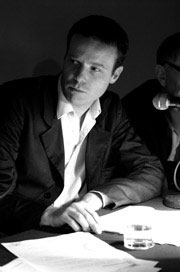General Secretary's Opening Address

Tom McCarthy: So, thank you all very much for coming. It's really good to see so many people here. Before we kick off properly I'm just going to spend a couple of minutes explaining what it is we're doing and why we're doing it. The First Committee of the International Necronautical Society has called these Hearings as we start preparing to set up our radio broadcasting station, which we hope is going to be fully operational at some point next year. To that end, we've invited here today a range of practitioners and theorists with special knowledge and expertise in the fields of sound, wireless electronic communication, cryptography and broadcasting. This delegation will be examining them about their work and recording their testimony so that it can be analysed over the following months as the INS Communications and Encoding Group begins configuring the proposed INS station.
Well, this project arises from a range of concerns, desires and conjectures that are too wide to enumerate right now... but one particular 'moment' really does deserve special mention, as it, it sort of serves as a template for almost all of our preoccupations around the issue of transmission. And that moment is the scene in Jean Cocteau's film Orphée in which the dead poet Cégeste transmits over the wireless lines of code which are picked up by Orphée on his car radio, in the, in the dead zone between stations, the white noise. Perhaps we could play that scene, just... this is where it all begins...
Orpheus's Death [on screen]: Emettez vos messages!
Cégeste: Madame, est-ce que je pourrai disapparaître et apparaître comme Heurtebise?
Orpheus's Death: Vous êtes trop maladroit. Emettez!
Cégeste [into microphone]: Jupiter rend sage ceux qu'il veut perdre... Je repète: Jupiter rend sage ceux qu'il veux perdre... deux fois...
Heurtebise: Orphée! Orphée!
Orphée: Quoi? Vous me laissez jamais tranquille!
Heurtebise: Votre femme est en grand danger.
Cégeste [on car radio]: ... Jupiter rend sage...

Tom McCarthy: That's fine. Thank you. So, Cégeste's messages, that you see him transmitting there and being picked up by Orphée, are modelled, Cocteau's modelling them, on the models generated by British and French Résistance agents in occupied France during World War Two. These people, who included Samuel Beckett incidentally, transmitting at enormous personal risk, were typically using code which was hidden in poetry (they were all very well-educated, very posh). So if you had the key, you knew that 'Jupiter rend sage ceux qu'il veut perdre' means, you know 'The aeroplane will land in such and such a field at three o'clock'; but if you didn't it was just a line of poetry. Well, it's the INS's very strong suspicion that this situation, which so closely conjoins technology, death, politics and the aesthetic around the figure of the radio, finds itself mirrored in many other contexts and will prove of seminal importance to our organisation.
So let me introduce the delegation. I'm Tom McCarthy, INS General Secretary. To my right is Anthony Auerbach, INS Chief of Propaganda. And to my left is our external assessor, Zinovy Zinik, a novelist and broadcaster. Originally from Russia, Zinovy has lived in London since 1976, where he's editor and presenter of the BBC's West End Radio Review. His seven novels, which have been translated into several European languages, include Russian Service, set in a fictitious émigré radio station, and Sounds Familiar (a New Frankenstein), which deals with the transformation of sound into matter. So from both a theoretical and a practical point of view he's a very appropriate person to have as external assessor. We're very happy to welcome him. He's also founder - oh, sorry: his novel The Mushroom Pickers was serialised by the BBC in 1994. And Zinovy is also founder, in collaboration with the New York-based Russian artists Komar and Melamid, of the Safety Pin Society of Great Britain.
Anyhow, that's all I really need to say at this point. I think we can move straight on to our first two witnesses, who are Manu Luksch and Mukul Patel.
[Top]
![]()